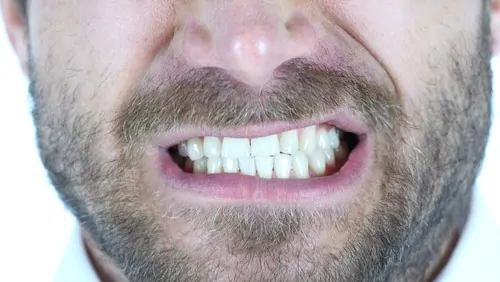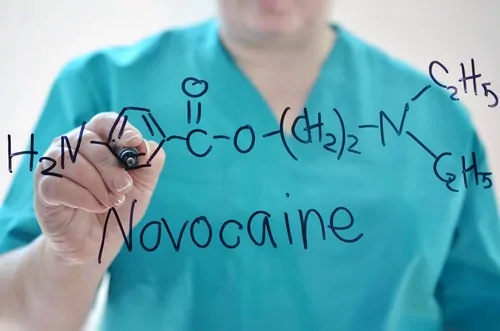Blog
How Stress Can Affect Oral Health

Stress can be caused by any number of things, such as work and family. But in these uncertain times, it’s only natural to experience elevated levels of stress. Too much stress can have negative effects on bodies such as headaches, stomachaches, increased heart rate, and overall feelings of anxiety. But your dentist in Douglasville also wants you to know that high levels of stress can also affect your oral health. Let’s examine a few ways in which this happens, as well as what you can do to help protect yourself.
- Jaw Pain & Discomfort
Your jaw joint, or your temporomandibular joint (TMJ), is one of the main areas where stress can affect your oral health. When we’re overly stressed, we tend to have a subconscious response that causes us to clench or grind our teeth repeatedly. This constant pressure on both the teeth and jaw muscles can lead to jaw pain as well as damage to teeth. Over time, if the clenching and grinding continue, you may develop TMJ disorder. This often painful condition is usually accompanied by jaw popping or clicking or even a locked jaw. It’s best to see your dentist in Douglasville when you start experiencing these symptoms.* - Canker Sores
Many of us have experienced the discomfort of the canker sore or other similar sores in our mouths. These sores often resemble ulcers and can be white or red spots or lines. While there is no definite cause of a canker sore, studies conducted by the Academy of General Dentistry support the hypothesis that canker sores can occur more often in those who undergo prolonged periods of stress. Canker sores can be annoying and a little bit painful, but they aren’t contagious. - Gum Disease
One of the most common dental diseases that affect Americans is gum disease. Typically, the cause of gum disease is poor dental hygiene or smoking. But there have been recent studies that suggest a connection between stress and gum disease. It’s also important to know that this oral health disease doesn’t only increase the risk of problems in the mouth, such as tooth loss, it can also contribute to problems throughout the body. Gum disease has been linked to overall health conditions such as heart disease, respiratory disease, and some cancers. Some signs of gum disease include bleeding while brushing or flossing, chronic bad breath, or swollen gums. If you notice any of these, call your dentist in Douglasville.*
Reduce Your Stress, Reduce Your Risk
Reducing stress levels can go a long way in protecting both your overall health as well as your oral health. While everyone is different and stress-management techniques can vary in effectiveness from person-to-person, there are a few trusted tips health professionals recommend.
- Sleep. Getting enough sleep every night can help our bodies recover and lower stress. If you have trouble falling asleep, try to avoid blue light an hour before bed, listen to calming music or sounds, and follow a regular routine of waking up the same time every day.
- Exercise. Whether you decide to go for a walk, dust off your yoga mat, or follow a workout video, make sure you do some sort of exercise every day. Physical activity can release endorphins and can decrease stress.
- Breathe. Simply focusing on your breathing or practicing daily meditation can do wonders in lowering blood pressure as well as stress. Take a few minutes every day to focus on deep breathing exercises or try out an app that guides you through a meditation session.
During these uncertain times, we’re bound to feel stressed out occasionally. Make sure you focus on identifying when you’re feeling this way and practice lowering stress levels to help keep your body, mind, and oral health in good shape.
*At the time of publishing, the ADA recommends that all preventive dental appointments and non-emergency consultations be postponed. Please check with your local regulations.
What’s Considered a Dental Emergency?

There’s a lot of uncertainty in the world today, including whether or not you should see your dentist in Douglasville. We’re here to help. As of April 1, 2020, the American Dental Association (ADA) has recommended that dentists across the country suspend all routine dental care to help reduce the spread of COVID-19 until at least April 30th. However, dentists may still be seeing patients who are experiencing dental emergencies. But what, exactly, is considered a dental emergency?
Defining Dental Emergencies
The ADA defines dental emergencies as “potentially life-threatening and require immediate treatment to stop ongoing tissue bleeding [or to] alleviate severe pain or infection.” Some signs indicating that you may be experiencing a dental emergency include:
- Bleeding that doesn’t stop
- Pain or swelling in or around your mouth
- Tooth or jaw pain
- Broken or knocked-out tooth
- Gum infection with pain and swelling
The ADA also lists “urgent” dental care as a secondary set of symptoms that may require early intervention by a dentist. Dental problems that are classified as urgent include:
- Severe dental pain caused by pulpal inflammation
- Third-molar pain
- Tooth fractures with pain or resulting in soft tissue trauma
- Post-op complications such as dry socket
- Abscess or localized bacterial infection with swelling
- Dental trauma that results in a lost tooth
- Lost or broken temporary restoration or if a restoration is irritating the gum tissue
- Cavities or decay that cause pain
It’s important to note that these lists do not include every possible situation of a dental emergency or urgent dental need. The best thing to do if you think you’re experiencing a dental emergency is to call your dentist in Douglasville to determine the best course of action.
What Can Wait?
There are several types of dental treatments that are not considered emergencies and should not warrant an immediate visit to the dental office. Non-emergency dental care includes, but is not limited to:
- Routine exams, cleanings, x-rays
- Cosmetic dentistry consultations or pre-scheduled treatments such as whitening
- Cavities that do not cause pain
- Extraction of teeth that are not painful
We understand that postponing your routine dental appointments may not be ideal, and while we’d love to see you, please help us and our entire community stay safe by staying at home.
*Please note, COVID-19 recommendations change regularly. Please refer to your local government for the most recent updates regarding dental care during this time.
3 Ways to Wear Off Novocaine

You know the feeling — you just had your appointment, and your dentist in Douglasville used novocaine to help make your treatment more comfortable. But now that you’re out of the chair and back at work, you can’t talk correctly, every time you take a sip of water it drips down your face, and you certainly can’t smile fully when half of your face is numb. Don’t worry, there are a few ways you can make the effects of novocaine wear off fast.
How Does Novocaine Work?
Before we understand how to reverse the numbness of novocaine, we need to know what it is and how it works. Novocaine is a local anesthetic that eases pain around the areas where it’s administered. While the chemistry behind novocaine is complex, the basics are easy to understand. Novocaine essentially blocks your nerves from sending pain signals to the brain, therefore making treatment comfortable and virtually pain-free. Your dentist in Douglasville may use novocaine prior to dental treatments such as:
- Fillings
- Root canals
- Extractions
- Cosmetic dentistry procedures
How Long Does Novocaine Usually Last?
This is a tough question to answer as the effects of novocaine can vary in duration based on how much your dentist uses for your specific body and procedure. Usually, novocaine will numb your tooth for about 1-2 hours. But that doesn’t mean the numbness immediately subsidies after that. The effects of novocaine can last for 3-5 more hours after you leave the dental office.
How to Wear Off Novocaine Faster
Don’t have an additional 3-5 hours to wait until you regain feeling in your lips and face? There are things you can do to help make the numbness wear off faster.
- Massage the Area. If your procedure wasn’t serious and you aren’t experiencing any pain or swelling, you can try gently massaging the area to increase blood flow. More blood into the affected area can help bring feeling back quickly. However, you should avoid touching the actual injection site or the treatment area directly, and you should always wash your hands prior to touching your lips, mouth, or face.
- Do Something Physical. Similarly to massage, getting your blood pumping by doing some physical activity can also help the numbness disappear faster. You can take a walk, hop on a bike, or perhaps even go for a run. Whatever your exercise of choice is, make sure you get your dentist’s approval before you jump into strenuous activity.
- Apply a Warm Compress. Applying heat to any part of our bodies will also increase blood flow, again perhaps helping novocaine wear off faster.
Other Novocaine Side Effects
While other side effects of novocaine are rare, they are possible and include:
- Dizziness
- Headaches
- Minor injection site pain
- Muscle twitching
If you experience these side effects, talk with your dentist in Douglasville prior to receiving novocaine.
Novocaine is an incredibly common part of routine dental work and truly helps make treatments easier and more comfortable for you. If you have questions or concerns about novocaine, never hesitate to ask your dental team. After all, we are here to help you get the care you need while keeping you comfortable every step of the way.
